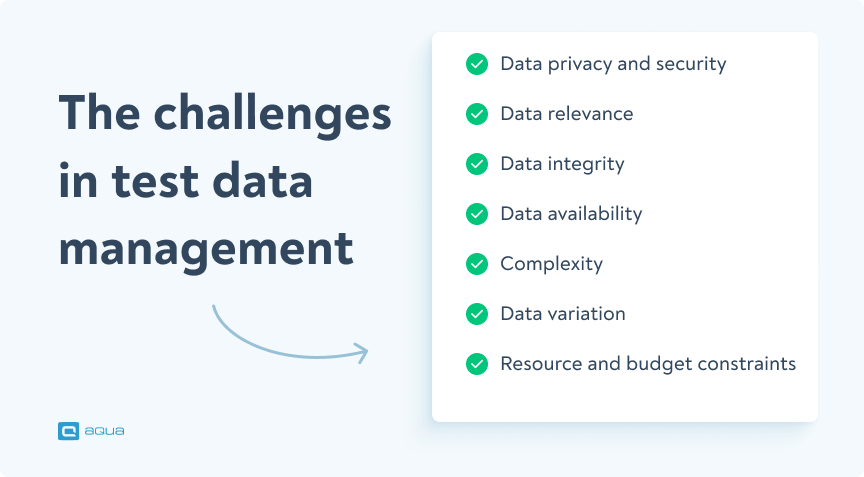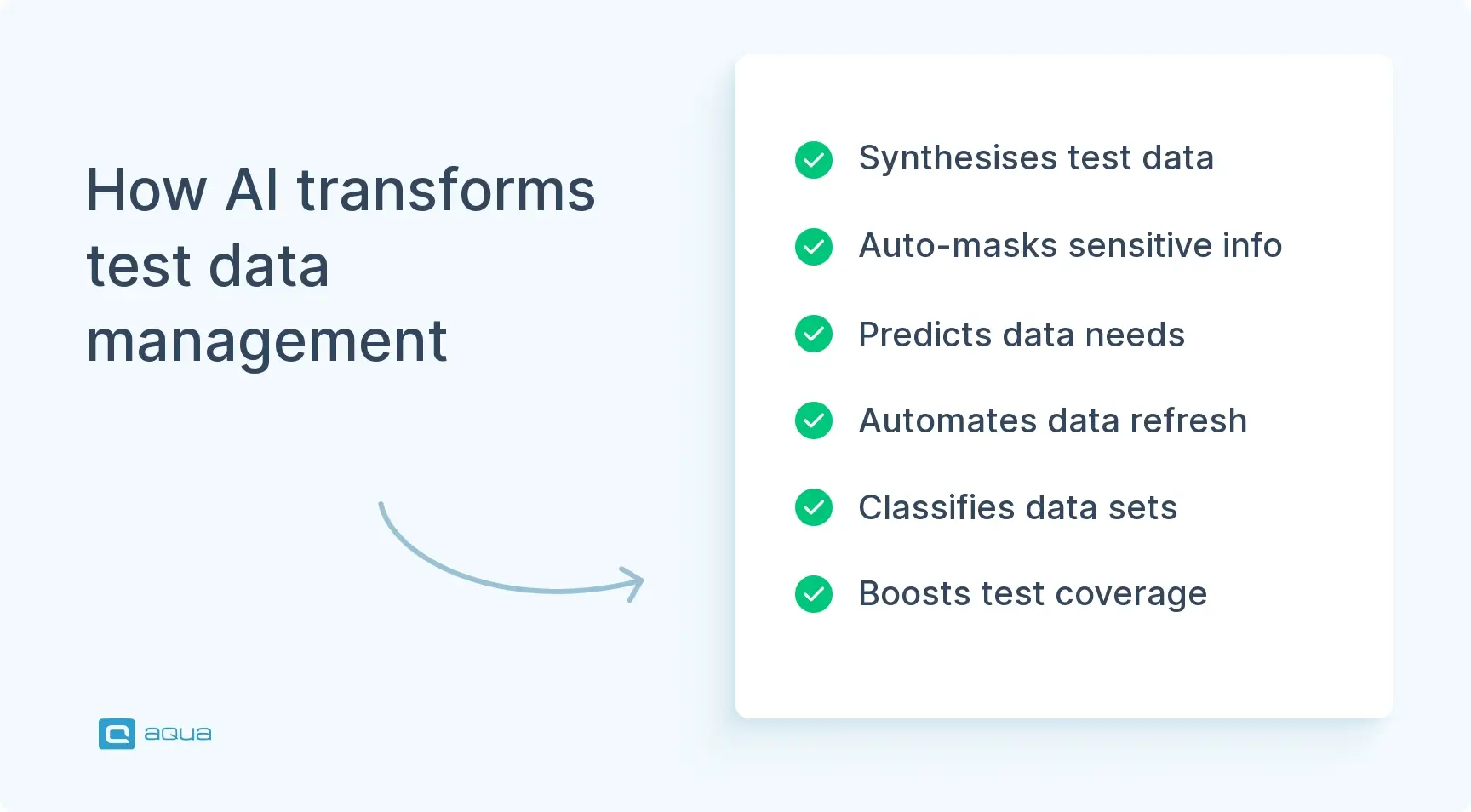Key Takeaways
- Test data management (TDM) strategically plans, creates, and maintains data for testing purposes while ensuring accuracy and compliance with privacy regulations.
- AI-powered solutions transform TDM by automating data masking, generating synthetic datasets, predicting defects, and classifying data for different testing scenarios.
- Major TDM challenges include maintaining data privacy, ensuring data relevance and integrity, managing complexity, and addressing resource constraints.
- Effective TDM strategies include data subsetting and masking, synthetic data generation, self-service provisioning, version control, and regular data refreshes.
- Modern test data management tools integrate with DevOps workflows, providing on-demand access to compliant test data while reducing waiting times and storage costs.
Many teams discover they have sensitive information hiding in unexpected places like log files and database backups, creating serious security risks. Find out how AI-powered tools can transform your testing process below 👇
What is test data management?
First, let’s start with the definition of test data management. Test data management is a critical process that involves the strategic planning, creation, maintenance, and provisioning of data for testing purposes.
Test data encompasses a wide range of data used during software testing. This data can include, but is not limited to, inputs, parameters, configurations, and even expected results. Test data is designed to simulate real-world scenarios and user interactions to assess the software’s performance.
TDM goes beyond the mere presence of data; it focuses on preparing, storing, and providing the right data in the right state and format to simulate real-world scenarios accurately. This ensures software is thoroughly evaluated under various conditions, minimising the risk of post-deployment defects and enhancing the overall product quality.
You don’t need to overthink test data management; you just need to start by implementing AI-powered data masking tools that automatically detect and scramble sensitive fields like SSNs or credit cards. Companies using these approaches see security incidents drop by nearly half.
Audit one testing environment this week and identify where real customer data is hiding. Most teams discover sensitive information in places they never expected — log files, database backups, even configuration scripts.
Remember: your biggest vulnerability isn’t the obvious customer tables; it’s the forgotten data copies scattered across development systems that pose the real risk. Additionally, it is a dynamic process, evolving with changes in software features, updates, and user behaviours.
The importance of TDM in QA
In QA, test data management (TDM) is a pivotal factor that significantly influences the effectiveness of testing processes. TDM goes beyond data provision; it holds together the various threads of software testing, ensuring a solid foundation for robust QA workflows.
You can craft testing scenarios that mirror real-world situations by carefully planning, creating, and maintaining test data. For instance, consider a banking application that requires testing. With TDM, you can create diverse test data, including various account types, transaction histories, and user profiles.
In 2015, HSBC suffered a data breach due to a failure in test data management. The bank sent emails containing sensitive customer information to the wrong recipients. The breach occurred because the bank used real customer data instead of anonymised or synthetic data for testing purposes. The emails contained details such as customers’ names, account numbers, and balances. This incident highlighted the risks of using real customer data in non-production environments and underscored the importance of proper test data management to prevent such breaches.
Can implementing meticulous data management processes effectively address and prevent such challenges? Without a doubt. But how do you achieve this? In the upcoming sections, we’ll delve deeper into this question while also gaining a comprehensive understanding of how to leverage test data in the context of quality assurance appropriately.
The challenges in test data management
Navigating the complexities of TDM is not easy: it demands strategic solutions. As you strive for efficient QA workflows and high-quality software, understanding and overcoming these issues is crucial. Here are some challenges you might face:
- Data privacy and security: One of the foremost challenges in TDM is managing sensitive data while adhering to strict privacy regulations. Ensuring that confidential information remains secure during testing without compromising compliance is a delicate balance that requires rigorous controls.
- Data relevance: The test data must accurately represent real-world scenarios. Inaccurate or outdated data can lead to unreliable test results, causing defects to slip through the testing process and into the final product.
- Data integrity: Maintaining the integrity of test data is paramount. If inconsistencies or errors creep into the data, testing outcomes become skewed, leading to unreliable insights into software quality.
- Data availability: Realistic test data is often limited, especially when replicating complex scenarios. Acquiring or generating suitable data can be time-consuming, delaying testing cycles.
- Complexity: Managing vast volumes of test data can become convoluted as software evolves. Proper categorisation, version control, and data cleanup are necessary for an organised TDM strategy.
- Data variation: hits you from every angle—location changes how your app behaves, different user roles unlock various features, and mobile versus desktop can completely shift the experience. Here’s the thing: you should start small by picking just one variation factor (like user roles) and nail that automation before expanding. Your tests actually mirror what users experience in production instead of running against sanitised, uniform datasets that tell you nothing.
- Resource and budget constraints: Comprehensive TDM demands data acquisition, storage, and management resources. Budget constraints can negatively affect the establishment of optimal TDM practices.

Accelerating DevOps with Modern Test Data Management
Modern DevOps teams are ditching those old manual test data processes for good reason. Today’s automated test data management solutions let you provision high-quality, compliant test data on demand, right from the start of your development cycle.
Here’s what makes the difference: these tools sync data from multiple production sources, automatically mask sensitive info, and give developers self-service access to what they need.
Remember: supporting continuous integration and quick rollbacks becomes straightforward, plus you’ll cut storage costs through smart data subsetting. Identifying your biggest data bottleneck is important, whether that’s waiting for refreshes or dealing with compliance issues. Once you automate that single pain point, you’ll see why quality assurance can actually keep up with your development pace instead of slowing it down.
How to manage test data and generate test data sets for test cases?
Mastering test data management cases is crucial for efficient software testing. Here’s how to effectively manage and generate test data for your test cases:
Managing test data
So, how do we manage our test data? If you want to have a comprehensive TDM process, you will have to follow these steps:
- Identify data requirements: Understand the data types required for testing, including input variations, boundary conditions, and real-world scenarios.
- Classify data: Categorise data based on different scenarios, functionalities, and user roles to ensure comprehensive coverage.
- Select data source: Choose data sources, including production databases, synthetic data generators, and external APIs.
- Keep your data secure: Ensure compliance with data privacy regulations by anonymising or masking sensitive information in the test data.
- Implement data versioning: Maintain different versions of test data to support regression testing and comparisons between different releases.
- Refresh data: Regularly update test data to ensure accuracy and relevance during testing cycles.
- Ensure access controls: Implement access controls to ensure only authorised individuals can access and manage test data.
Generating test data sets
- Use test data generators: Leverage automated tools to generate synthetic test data. These tools can create data variations that stress different aspects of your application.
- Include diverse data: Ensure diversity in generated data sets to cover various scenarios and edge cases.
- Consider the functional scenario: Align generated data with specific functionalities being tested, considering input combinations and expected outcomes.
- Conduct boundary testing: Include test data sets that test boundary conditions and extreme values to identify potential vulnerabilities.
- Note data relationships: Consider data dependencies and relationships to simulate realistic interactions within your application.
- Test data volumes: Generate data sets of varying sizes to test application scalability and performance under different loads.
- Use automation: Integrate test data generation into your test automation frameworks using AI-powered test management tools.
- Randomise: Introduce randomness in test data generation to cover unpredictable scenarios.
- Check validation rules: Ensure that generated data adheres to validation rules and constraints within the application.
- Regularly refine: Continuously refine and enhance your test data sets based on evolving testing needs and changes in the application.
Best Practices for AI-Powered Test Data Security, Privacy, and Accuracy
Protecting test data doesn’t have to be a headache anymore – AI has completely changed the game. Modern machine learning tools automatically spot and flag sensitive stuff like personal info, then apply smart masking that actually understands context. This isn’t your basic find-and-replace approach.
Format-preserving encryption and differential privacy techniques keep your data useful while locking down the sensitive bits. Generative AI can now create synthetic datasets that behave exactly like your real data without any actual customer information. It’s perfect for those ultra-sensitive scenarios where even masked data feels too risky.
Start with this concrete step: implement automated PII discovery across your existing test datasets. Most teams find thousands of overlooked sensitive fields within the first week. AI validation tools will continuously check data quality and fix broken relationships between records – stuff that used to take your team hours every sprint.
These synthetic datasets often perform better in testing than traditional masked data because they’re designed to hit edge cases your production data might miss. The result: you get bulletproof compliance, rock-solid data quality, and your developers can actually focus on building instead of wrestling with data prep.
Strategies and techniques for effective test management
You can ensure accurate testing, reduced defects, and streamlined QA workflows by employing the right strategies and techniques for test data management. Here are some test data management best practices:
Data subset and masking:
Extract relevant subsets of production data to mimic real-world scenarios. Mask sensitive information to comply with privacy regulations while retaining data realism.
Data generation:
Generate synthetic test data to expand testing scenarios. Use tools to create diverse data sets that stress different application functionalities.
Test data provisioning: Implement self-service portals for QA teams to request and access specific test data. Automate provisioning to reduce manual intervention and accelerate testing cycles.
Data versioning:
Maintain different versions of test data to support historical testing and regression analysis. Ensure that testing remains consistent across various iterations of the software.
Data refresh and cleanup:
Regularly refresh test environments with up-to-date data to ensure accuracy. Clean up obsolete or redundant test data to maintain efficient testing environments.
Test data monitoring:
Establish monitoring mechanisms to track data usage and identify discrepancies. Detect data anomalies early, preventing inaccuracies from affecting testing outcomes.
Data consistency checks: Integrate data consistency checks into testing processes to ensure accurate data transmission. Verify data integrity during testing to prevent anomalies that stem from data discrepancies.
In your pursuit of efficient test data management, aqua offers a seamless solution through its integrated “Test Data Generator.” It simplifies creating diverse and dynamic test data sets, aligning them with specific functionalities, and ensuring data accuracy. With aqua’s Test Data Generator, you can manage your test data seamlessly while following the steps we mentioned above. Combine this generator with aqua’s ability to centralise test data, facilitate rapid provisioning, and adapt to changing project needs, and you get the perfect, modern solution for your test data management.
Streamline your Test Data Management with aqua’s Test Data Generator
The future of test data management
The landscape of test data management is poised for transformation. The importance of efficient TDM is rising as organisations recognise its critical role in ensuring software quality. With this evolution, test management tools are becoming essential allies, and the emergence of AI-powered solutions like aqua cloud is set to redefine the future of TDM.
How do AI-powered GPT solutions revolutionise TDM?
There’s room to enhance overall system quality and reliability while safeguarding sensitive data in a world of efficient testing and exceptional coverage. Welcome to the future of testing, where AI is the driving force. Here is how AI-powered solutions revolutionise TDM:
Data synthesis: AI’s magic lies in its ability to craft synthetic data, leveraging patterns mined from accurate data without exposing sensitive information. Here, Generative Adversarial Networks (GANs) take centre stage, conjuring realistic data sets out of thin air.
Data masking & anonymisation: Privacy, a paramount concern, is tackled head-on by AI. It identifies and expertly masks sensitive data, retaining the data’s utility. AI excels in recognising patterns to ensure anonymised data stays meaningful.
Predictive analysis: No more waiting in limbo. AI predicts the demand for specific data sets, slashing testers’ waiting time. It even forecasts potential defects based on the data in use, ensuring a proactive approach to quality assurance.
Automated data refresh: Stay in sync with the ever-changing data landscape. AI monitors shifts in the original data source and seamlessly updates test data, maintaining relevance.
Data classification & categorisation: AI lends a hand in effortless data organisation. It automatically tags and categorises data, streamlining selection for diverse testing scenarios.
Adaptive test data coverage: Imagine test data that evolves intelligently. AI algorithms adaptively generate data based on past bug encounters, refining test data with each iteration.
Data quality assessment: AI’s critical eye ensures pristine test data. It checks for inconsistencies, missing values, and anomalies that could skew testing results.
Scaling & distribution: AI optimises the distribution of test data across environments, making resource utilisation a breeze.

aqua cloud - your perfect solution for TDM
Having witnessed the revolutionary impact of AI on Test Data Management, you might ask, is there a perfect solution that can transform your testing endeavours? It’s time to introduce you to aqua cloud, the leading AI-powered test management software that has set a new standard in the industry. Here is how aqua cloud, the first AI-powered TMS on the market, will revolutionise your testing process and help you deliver high-quality software with unprecedented efficiency and precision:
AI Meets TDM: With aqua, you’ll experience the true synergy of AI and Test Data Management. Gone are the days of complex, time-consuming test data creation. Our platform harnesses AI to provide the intelligence and simplicity your testing process deserves.
Intelligent test data generation: aqua’s AI-driven test data generation ensures that you’re equipped with the data you need and when you need it. No more sifting through mountains of irrelevant data.
Data security at its core: In this age of data privacy concerns, aqua stands as your fortress. Although aqua works with OpenAI technology directly, it keeps your sensitive information safe without the risk of it being stored or used by others. In the process, your data remains useful and secure. In solutions like ChatGPT, your data can be used for ML training and potentially exposed later.
Continuous improvement: Our platform thrives on feedback. aqua cloud is not static; it learns and evolves from your testing experiences, constantly optimising and improving the testing process.
Streamlined workflow: Experience the efficiency and effectiveness of aqua’s streamlined workflow. Say goodbye to unnecessary complexity and hello to a testing process that just works.
Future-ready testing: As the testing landscape evolves, aqua ensures you’re future-ready. AI-driven predictive analysis keeps you one step ahead, anticipating needs and defects before they arise.
Now that we’ve explored the game-changing potential of AI in Test Data Management, it’s time to take the next step. Dive into the world of QA testing tool aqua, where AI transforms not just testing but the very way you do business. Welcome to the future of testing.
Step into the world of the first AI-powered TMS
Conclusion
Test data management involves strategically planning, creating, maintaining, and provisioning data for software testing. While guaranteeing the accuracy of testing scenarios and data relevance, it upholds privacy regulations. The effectiveness of test data management is undeniable, yet achieving it can be resource-intensive and time-consuming. This is where specialised tools like aqua come into play. With its advanced test and data management capabilities, aqua introduces a layer of simplicity and organisation to the process. Further enriched by its AI copilot and AI functionalities, aqua transforms manual efforts into streamlined and seamless automation. With aqua by your side, achieving effective Test Data Management becomes notably effortless, living up to the promise of taking away the pain of testing.


















